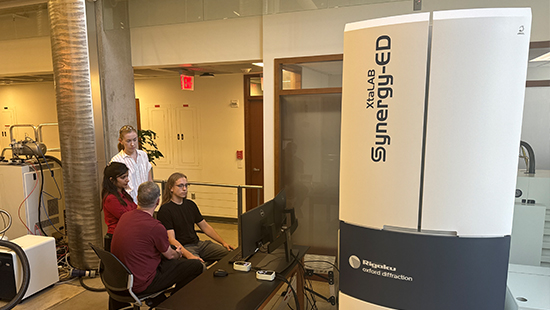First U.S. Installation of XtaLAB Synergy-ED at Northwestern Chemistry
August 30, 2024
Northwestern Chemistry Advances Research Capabilities with First U.S. Installation of XtaLAB Synergy-ED, a Dedicated Electron Diffractometer for MicroED/3D ED
 Northwestern University’s Department of Chemistry proudly announces the installation of the XtaLAB Synergy-ED, the first turnkey electron diffractometer in the United States, at the Integrated Molecular Structure Education and Research Center (IMSERC). This groundbreaking instrument will significantly enhance the department’s ability to understand the structure and behavior of materials, with potential impacts in catalysts, hydrogen storage, carbon capture, water remediation, and more.
Northwestern University’s Department of Chemistry proudly announces the installation of the XtaLAB Synergy-ED, the first turnkey electron diffractometer in the United States, at the Integrated Molecular Structure Education and Research Center (IMSERC). This groundbreaking instrument will significantly enhance the department’s ability to understand the structure and behavior of materials, with potential impacts in catalysts, hydrogen storage, carbon capture, water remediation, and more.
Developed in collaboration with JEOL, the Rigaku XtaLAB Synergy-ED is a powerful tool capable of analyzing tiny crystals with sub-angstrom diffraction resolution—a level of precision that surpasses the most sophisticated X-ray technologies available, including those offered by synchrotrons. The process begins by carefully positioning nanocrystals within the device, where the XtaLAB Synergy-ED directs a focused electron beam onto the sample. This beam interacts with the crystal structure, producing detailed diffraction patterns that the equipment then captures and processes. The resulting data allow researchers to construct precise atomic models, revealing structural details at an unprecedented level. With the installation of this equipment in IMSERC, Northwestern Chemistry is setting a new standard in molecular and materials science, distinguishing itself from other research institutions.
Research Impact
 The introduction of the XtaLAB Synergy-ED was made possible through the efforts of Nathan Gianneschi, Jacob & Rosaline Cohn Professor of Chemistry, and Omar K. Farha, Charles E. and Emma H. Morrison Professor of Chemistry. Gianneschi’s successful application for funding through the Defense University Research Instrumentation Program (DURIP) was instrumental in securing the necessary grant. Their combined research expertise, along with IMSERC’s collaborative research environment and skilled staff made Northwestern Chemistry the ideal location for the first U.S. installation.
The introduction of the XtaLAB Synergy-ED was made possible through the efforts of Nathan Gianneschi, Jacob & Rosaline Cohn Professor of Chemistry, and Omar K. Farha, Charles E. and Emma H. Morrison Professor of Chemistry. Gianneschi’s successful application for funding through the Defense University Research Instrumentation Program (DURIP) was instrumental in securing the necessary grant. Their combined research expertise, along with IMSERC’s collaborative research environment and skilled staff made Northwestern Chemistry the ideal location for the first U.S. installation.
The Gianneschi Group, which specializes in designing and synthesizing bio-inspired soft materials and molecules for incorporation into hierarchical structures, will see a significant acceleration in the characterization process thanks to the high-throughput capabilities of this dedicated electron diffractometer.
The Farha Group, renowned for its pioneering work in metal-organic frameworks (MOFs), will also greatly benefit. The new equipment dramatically reduces the time required to determine MOF structures—from several hours or even days to just a few minutes—using crystals that are 10 to 50 times smaller. This speed and precision will greatly enhance researchers’ ability to discover and engineer new MOFs, saving both time and resources.
Department-Wide Benefits
Housing the XtaLAB Synergy-ED within IMSERC, the department’s dedicated core facility, ensures that all researchers benefit from its advanced structural analysis capabilities, driving innovation across multiple disciplines. This instrument also provides Northwestern Chemistry students with a competitive edge, offering unique hands-on experience and training on technology unavailable in other PhD programs across the United States.
Looking Ahead
As Northwestern Chemistry continues to lead in cutting-edge research, the addition of the XtaLAB Synergy-ED marks a pivotal moment in the department’s ongoing pursuit of scientific excellence. This new capability not only solidifies Northwestern’s position at the forefront of molecular and materials science but also opens exciting new possibilities for discovery and innovation.
For more information about the XtaLAB Synergy-ED and research access, please contact IMSERC via the website.
The Department of Chemistry at Northwestern is grateful for the funding from the Air Force Office of Scientific Research (AFOSR) through the Defense University Research Instrumentation Program, Grant FA9550-24-1-0058, which made the purchase and installation of the Rigaku XtaLAB Synergy-ED possible.
